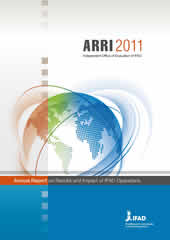Annual Report on the Results and Impact 2011 - IOE

Annual Report on the Results and Impact 2011
This is the ninth Annual Report on Results and Impact of IFAD Operations (ARRI) produced by the Independent Office of Evaluation of IFAD (IOE). It consolidates and synthesizes the results and impact of IFAD-funded operations, using as its basis independent evaluations conducted by IOE, and it raises issues and highlights lessons learned that can contribute to improving IFAD’s development effectiveness. This ARRI draws on a larger number of project evaluations and country programme evaluations than any other edition has thus far.
Project performance
The performance of IFAD-supported projects continues to be satisfactory in the areas of relevance, effectiveness, rural poverty impact, innovation, and gender equality and women’s empowerment. IFAD’s own performance as a partner has improved in the past years as well, in large part because of its progressive transition to direct supervision and implementation support, the expansion of its country presence, and more systematic portfolio management. One qualification, however, is that moderately satisfactory performance remains the norm. There is therefore still scope for further improvement.
There are some areas where performance is not as satisfactory. The efficiency of IFAD- funded operations, natural resources management and the environment, and the sustainability of project benefits are areas where performance still remains weak, but has nonetheless improved over time. The performance of recipient governments, in contrast, has not shown much improvement during the past decade.
For the first time this year, the ARRI compares the project evaluation results by IOE, the Fund’s independent evaluation system, with those generated by IFAD Management in its self-evaluation systems. It is reassuring that the “disconnect” between the two is relatively narrow. This attests to the increasing robustness and reliability of IFAD’s overall self-evaluation system. The ARRI has, however, identified a number of systemic lessons and issues for Management to consider when further developing the project completion review process, which is a key component of IFAD’s self-evaluation system.
The benchmarking analysis conducted in the context of the ARRI concludes that the performance of IFAD-supported projects is on the whole slightly better than the agriculture sector operations funded by the African Development Bank, the Asian Development Bank
and the World Bank. In terms of benchmarking performance across the five geographic regions, IFAD operations in the West and Central Africa region remain most challenging compared to other regions.